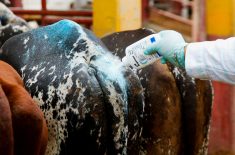New joint research by scientists in Manitoba and Australia will seek out proteins in dairy for their impact in preventing and managing chronic diseases.
The initiative, led by the Richardson Centre for Functional Foods and Nutraceuticals in Winnipeg, will involve scientists at University of South Australia’s Nutritional Physiology Research Centre, the Centre for Agri-Health in Research and Medicine at Winnipeg’s St. Boniface Hospital, and the University of Manitoba’s Food Science and Human Nutritional Sciences departments.
The partners said in a release Thursday that they set the study protocols for the first project — a joint human clinical trial to see if consuming more dairy protein can improve body composition and counteract disease in at-risk individuals — during a recent Manitoba business mission to Australia.
Read Also

U.S. not ready to lift Mexican cattle ban over screwworm, Agriculture Secretary Rollins says
The U.S. is not yet ready to reopen its border to Mexican cattle amid an outbreak of the flesh-eating New World screwworm parasite, Agriculture Secretary Brooke Rollins said, but she is pleased with Mexico’s efforts to contain the pest.
The project will look at efficacy, structure and function in bioactive proteins found in dairy products that target prevention and management of diabetes, cardiovascular disease, and obesity — a cluster of disorders associated with metabolic syndrome, said Richardson Centre research and development manager Dr. Curtis Rempel.
This research will focus on “environmentally friendly” technologies for isolating functional bioactives from dairy products and evaluate the potential of dairy products, such as drinkable yogurts, as “carriers” of other bioactive compounds, Rempel said.
In the longer term, the research will turn to fractionating the dairy protein, so the bioactive components may be identified and evaluated in experimental studies and in more human trials in both Canada and Australia, the researchers said.










